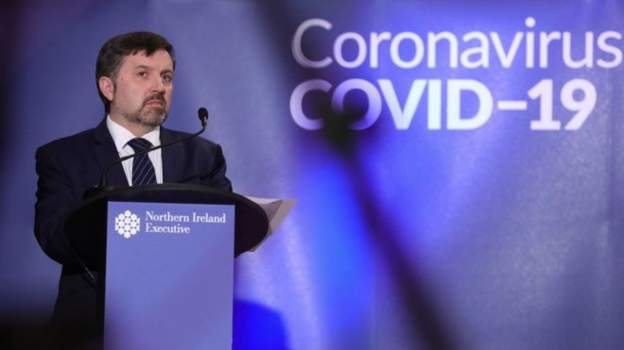
Health Minister Robin Swann wants to lift remaining Covid-19 restrictions
The detail is contained in a letter Mr Swann sent to other ministers, after receiving legal advice earlier.
On Monday, he said he hoped to remove the bulk of the rules this week, in the absence of a functioning executive.
But he has been advised that without an Executive, he cannot act alone to amend or revoke the regulations.
The letter states government lawyers have suggested the issue would be “significant” and therefore subject under the terms of Stormont’s ministerial code, to require executive approval.
The code states that ministers have a duty to bring any matter to the executive which could be deemed significant, controversial or cut across the responsibility of another department.
It is understood that Mr Swann has also been advised that if other ministers agree that changing the regulations would not fall into one of those three categories, he could proceed to lift the rules with minimal risk.
Although the Covid regulations were drafted by the Department of Health, any decision to alter them since the pandemic began had been taken collectively by the five-party executive.
The Executive collapsed last week after the DUP withdrew Paul Givan as first minister, triggering the ousting of Michelle O’Neill as deputy first minister as the roles are joint.
It also meant a meeting of all ministers to review the remaining rules could not take place on Thursday as it must be chaired by the first and deputy first ministers.
In Mr Swann’s letter to other ministers, he said he had already stated publicly earlier this week that decisions on amending executive restrictions may not be “straight-forward” due to the absence of the executive.
He added: “That has proven to be the case.
“This is a situation not of my making and it is matter of deep regret that we do not have collective executive leadership to take our society forward to a new phase in the pandemic response.”
The minister said the advice he received meant it may be the case that he has the power to amend only some of the restrictions without executive approval, because they “do not individually meet the threshold” for referral.
The letter also states that Mr Swann has been advised that he should assess whether the decisions being proposed are ones he would have been obliged to bring to the executive if it was still in place.
“I would emphasise that this is a different test to simply considering whether practice has been to bring such matters to the executive,” he added.
Mr Swann has now asked other ministers to consider the extent to which they believe changing the restrictions meets the criteria of a decision reserved for the whole executive.
He has asked for responses by 1 pm on Monday, February 14.
The Covid-19 regulations are legally in force until Thursday, March 24, but the executive had previously been carrying out a review of the rules every three weeks.
What Covid restrictions remain?
So-called Covid passports remain in place for nightclubs as well as for indoor unseated and partially-seated events with 500 or more people in attendance.
A maximum number of 30 people are permitted to gather.
The minimum self-isolation period for people testing positive for Covid-19 is five full days, subject to negative lateral flow tests on days five and six of a person’s isolation.
Other rules still in force include:
the legal duty on retail to take reasonable measures to reduce the risk of transmission
the legal requirement to wear face coverings and the associated duty on businesses to take reasonable measures to ensure compliance
the legal requirement for risk assessments in prescribed settings
the legal requirement for recording visitor information in prescribed settings
the remaining legal requirements in relation to Covid-status certification
the guidance on the regular use of lateral flow testing, and in particular before meeting up with others.
Tags:





